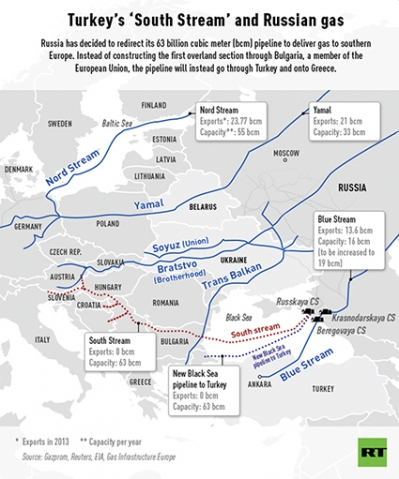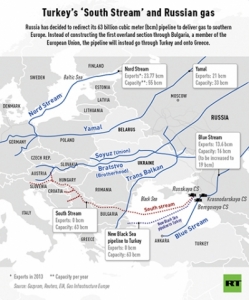Without Europe There Will Be No Gazprom
The next concessions of the European Commission to Gazprom show who is actually running the affairs in Brussels.
Russia has confirmed the primacy of Nord Stream, a natural gas pipeline through the Baltic Sea, in its efforts to replace Ukrainian transit routes for gas exports to Europe, diminishing the likely role to be played by its southern counterpart, Turkish Stream.
The European Commission wants to know the views of EU members on the development of the Nord Stream project. The main condition is that it coincides with the position of the Brussels officials. And they have already decided that Gazprom will get permission to lay a new pipe on the bottom of the Baltic Sea. This is likely to be followed by new permits for new gas pipelines, which will replace the main route of gas supplies from Russia now passing through the territory of Ukraine.
In this insanity, logic is found, and when it is not known what the matter is, it seems that the matter is in the money. And in big money: they are hoping to get the main allies of Russia in Brussels- the Germans and Austrians. Concerns from these countries actively cooperate with Russia, have shares in the fields, participate in production and so on. Recently, Putin met with the head of BASF, the German chemical giant and key partner of Gazprom. It was, of course, about the project "Nord Stream - 2", claimed official reports. According to unofficial information, the Germans received certain concrete promises in exchange for their help in Brussels. The active lobbying of the Russian project is the payment of debt to the Kremlin, which kindly allowed them to divide up their huge raw pie.
The same can be said about the Dutch company SHELL, which is cooperating with Gazprom, in particular in shale deposits. This is not too publicized, because at the official level, Russian shale gas is criticized.
Why are businessmen dazzled by money, unprincipled in extolling Russian gas, and why are they trusted by European politicians? The answer to this question is not so easy. I believe that they are poorly versed in the topic and simply do not want to deepen their knowledge. If they wanted to do this, they might be surprised to find that the presence in Europe for the Russian state concern is a matter of life and death. This is its most important market, which provides Gazprom with the lion's share of its profits. Without Europe, the concern would lose its sense of existence.
Last year, Gazprom sold 179.3 billion cubic meters of gas in Europe, with a total export volume of 220 billion cubic meters. The share of the Kremlin-controlled group is 34 percent on the EU market, and exports to Europe brought $ 30 billion in cash currency per year even at low energy prices.
All these arguments could allow the European Commission to demand from Russians competitive prices and fair contracts, but they are not in a hurry to do so. Since the beginning of the year, thanks to the purchases of Germans, Austrians and recently Italy added to the gas pie, gas supplies from Russia have increased by 21 percent. Germany, the main customer of Gazprom, increased the volume of purchases by 24 percent year-on-year. It is not surprising that Gazprom expects this year to increase its market share to 36-37 percent and earn $ 35 billion.
Brussels officials should also know that the cost price of gas production from Gazprom is one of the lowest in the world, so it can safely reduce prices for "its" obedients, and raise it for the rebellious - Poland or The Baltic States.
Brussels should also recall that Gazprom has lost its biggest client, Ukraine, and is now trying to fill this loss. In 2006-2007, Kiev bought from Russia 56-57 billion cubic meters of gas. No one has since achieved such import volumes. Germany last year bought 45 billion cubic meters.
The Russians say that the new branch of the Nord Stream gas pipeline will increase security of supply, as Ukraine is unstable. Do not they know in the European Union who creates and fuels these conflicts?
The Russians also argue that the more Russian gas pipelines appear, the cheaper the gas for the EU will become, and more competitive Gazprom will be in this market. Such an argument shows that the concept of "competition" to Russians is completely alien.
Most of the EU members said "no" to the Nord Stream-2 project, which will be a huge loss for the German, Austrian, Italian and Dutch businesses that cooperate with Russia. Only blocking the next Russian projects will allow there be real competition in the European gas market and will show Moscow that Brussels will not be fooled.
Dimitri Dolaberidze











